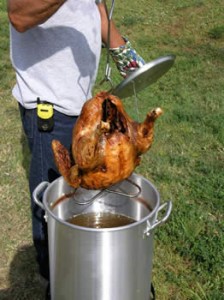 As Thanksgiving is here, Pennsylvanians across the commonwealth are dusting off their turkey fryers and preparing to deep fry a home-cooked meal. While a tasty alternative to the traditional oven-roasting method, turkey fryers potentially pose significant risks to personal safety and property.
As Thanksgiving is here, Pennsylvanians across the commonwealth are dusting off their turkey fryers and preparing to deep fry a home-cooked meal. While a tasty alternative to the traditional oven-roasting method, turkey fryers potentially pose significant risks to personal safety and property.
The U.S. Fire Administration reports that nearly 2,400 house fires occur nationwide on Thanksgiving, causing numerous fatalities, injuries, and $19 million in property loss. Many of these home fires are due to deep-frying accidents.
“Cooking is the number one cause of house fires, and more cooking fires occur on Thanksgiving than any other day of the year,” said acting State Fire Commissioner Bruce Trego. “Pennsylvania is routinely among the states with the highest number of turkey fryer incidents.”
Here are some tips to keep you, your guests and your property safe:
· Read the turkey fryer owner’s manual thoroughly for proper set-up and safety tips.
· Make sure the turkey is completely thawed before frying (hot oil and ice/water do not mix).
· Use the correct amount of oil. Overfilled fryers increase the likelihood of oil spilling out of the pot and hitting the burner causing flames to engulf the entire unit.
· Never leave the fryer unattended. Many fryer’s lack thermostats to prevent
overheating.
· Keep children and pets away from the fryer.
· Use proper hand protection. Lids and handles of the cooking pot get dangerously hot, posing severe burn hazards.
· Have an all-purpose fire extinguisher nearby. Never use water to extinguish an oil fire.
· Do not deep fry your turkey inside your garage, on your porch or deck, or inside your home.
· Use your fryer outside, away from trees, walls, fences and other structures.
Homeowners insurance policies will cover items such as the structure of your home, your personal belongings and liability protection for injury to your guests, but it is best to do what you can to avoid these types of insurance claims in the first place. However, it’s important to note that if you rent, your belongings will not be covered unless you have a renters insurance policy. Your landlord’s insurance will likely cover the building, but not the contents you own, so if you rent, make sure you have renters insurance.
“Following these tips will help your family prevent a costly and potentially
dangerous situation,” Insurance Commissioner Jessica Altman said.
Visit BeFireSafePA.com (http://www.osfc.pa.gov) for additional fire safety tips, and the turkey fryer fact sheet.
